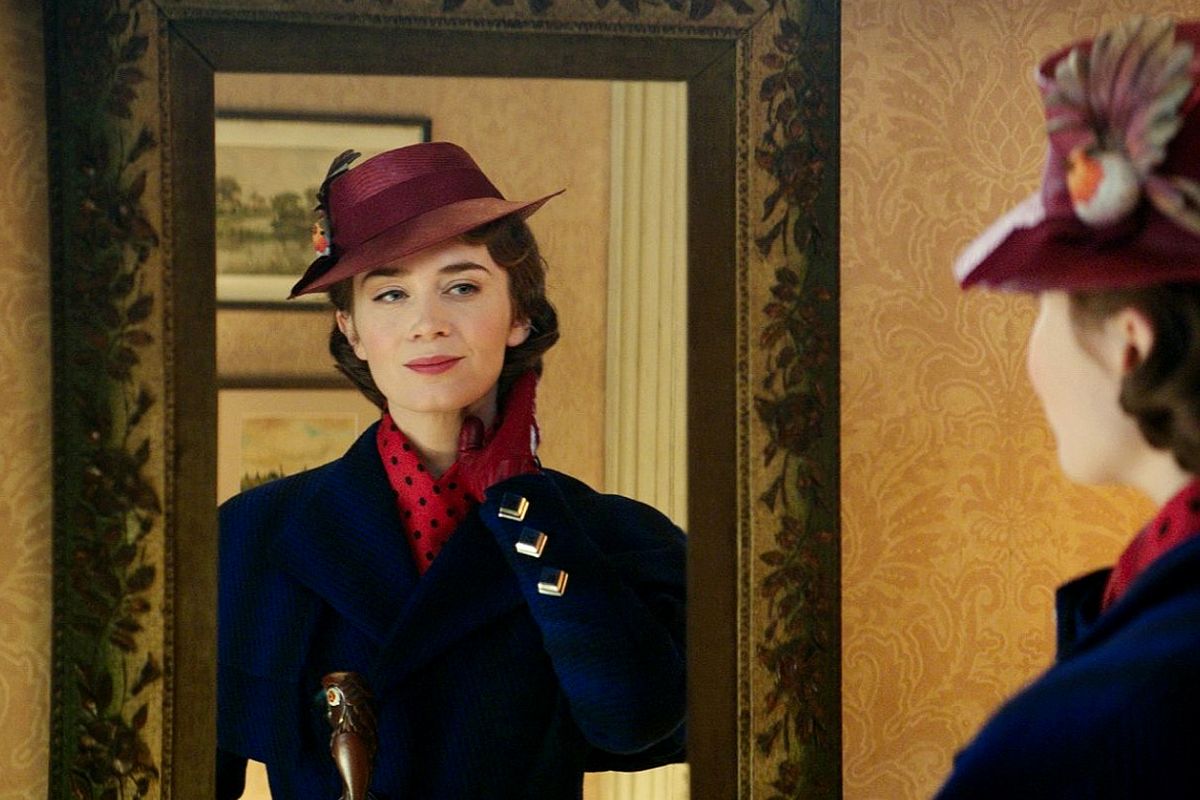The Disney musical Mary Poppins Returns (PG) opened in theaters this week, more than five decades after the Oscar-winning original was released.
Michael Banks is a young widower and father of three who is facing eviction from the London home he inherited from his father.
It seems the struggling Banks unwisely used his house as collateral on a loan, and he’s now three payments behind.
But that’s OK. His father owned shares in the local bank that can be redeemed for enough cash to pay down the loan. If only he could find the paperwork.
He searched the attic. He combed the bookshelves. He even asked the bank if they had proof of the transaction. Everything came up empty.
With an eviction pending and the children still mourning the death of their mom, the Banks family sure could use some cheer.
Then an old friend drops from the sky underneath a big umbrella. Her name is Mary Poppins, the woman who served as a nanny for Michael and his sister Jane when they were children. She wants to take care of Michael’s children—Anabel, John and Georgie—during the family crisis. Who knows? She even may help the family keep their home.
The Disney musical Mary Poppins Returns (PG) opened in theaters this week, more than five decades after the Oscar-winning original was released. Just like the 1964 version, the sequel takes place on Cherry Street Lane in London. This time, though, the setting is the Great Depression—the “Great Slump” as they called it in the U.K.—and families across the city are barely making ends meet.
The movie stars Emily Blunt (A Quiet Place) as Mary Poppins, composer Lin-Manuel Miranda (who wrote the music for Moana) as the lamplighter Jack, and Ben Whishaw (the voice of the bear in Paddington) as Michael Banks.
Blunt is the perfect fit for the role that Julie Andrews popularized. The movie may not be as good as the original—what is?—but it’s still very, very good.
It has the same feel, the same look, the same pace.
Like the original, it features goofy songs and quirky scenes (my favorite: the room where everyone is upside down). Like the original, it showcases a mixture of animation and live action (my favorite: Mary Poppins and the kids “enter” a painted scene on a family bowl, interacting with the animals and characters). Like the original, it has catchy, toe-tapping songs (Trip a Little Light Fantastic is a good one).
From beginning to end, Mary Poppins Returns almost seems like a movie made in the ‘60s.
Warning: minor/moderate spoilers!
(Scale key: none, minimal, moderate, extreme)
Violence/Disturbing
Minimal. Georgie is kidnapped by cartoon character thieves in a truck. A chase scene ensues, and his siblings are able to get him back. We also hear the children discuss how much they miss their mother.
Sexuality/Sensuality/Nudity
None. We hear a song that mentions a “birthday suit.”
Coarse Language
None. We hear the British word “bloody.”
Life Lessons
The lessons in Mary Poppins are ones we all can learn: live life with joy, slow down, learn to laugh more, recapture the simple pleasures of your younger years.
Worldview
Just like the 1964 film, Mary Poppins Returns doesn’t tell us where she gets her powers.
“One thing you should know about Mary Poppins,” one person says when her “magical” abilities are questioned. “She never explains anything.”
But the word “magic”—a concept that repels some moviegoers—is never used. Perhaps that’s because the story of Mary Poppins isn’t about magic. It’s about childhood.
The 1964 and the 2018 films are a celebration of the things that make childhood great— imagination, creativity, wonder and laughter. All are gifts from a creative God.
The films are a recreation of what children might do if they had the “power” to act out their imaginary worlds. It’s a joy to watch (and hear).
The other day, my youngest son and I discussed what it would be like if zoo animals could buy groceries at the local store—you know, if they had money and human brains. If you set his story to music and added a few goofy words, I bet it would sound a bit like a song in Mary Poppins Returns.
Sponsors
For children, Subway likely is the most well-known partner.
What Works
Mostly everything. If every sequel to a classic was this true to the original, I’d want more of them. Some moviegoers will say the music isn’t as catchy as the 1964 soundtrack—and they’re likely right—but I wonder if our attachment to that classic film is based on nostalgia. For example, will the moviegoer in 50 years automatically prefer the original music? That’s a good question.
What Doesn’t
I’m being picky, but it would have been nice to have another “G” rating on a Mary Poppins film. The chase scene is what warranted the “PG.”
Discussion Questions
- Why is imagination and laughter so important in a child’s life? In our lives?
- Why do we forget the simple pleasures in life as we age?
- What is your view on the “magic in movies” debate? Does Mary Poppins Returns have magic?
Entertainment rating: 3.5 out of 5 stars. Family-friendly rating: 4.5 out of 5 stars.
Rated PG for some mild thematic elements and brief action.
